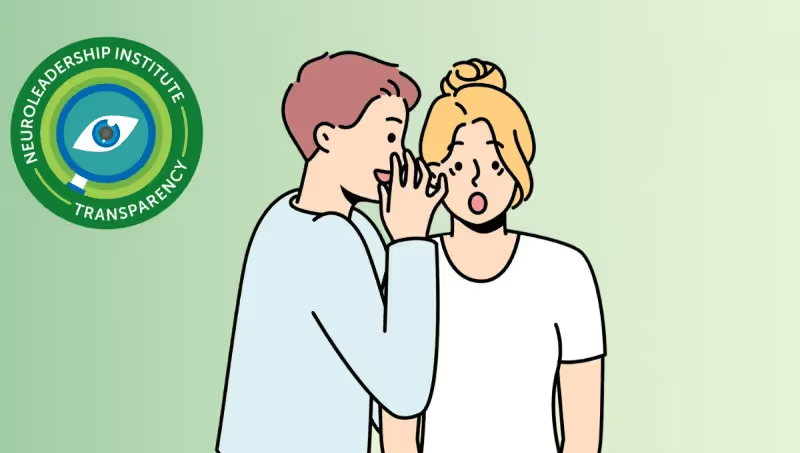One of your co-workers privately messages you saying he has something to share, ending the message with, “But you can’t tell a soul!” You instantly feel a rush of excitement for being the chosen one and also an intense curiosity for what the secret could be. Later, while having lunch together, he asks again, “Are you sure you can keep this secret?” You immediately answer, “Yes!” He then shares that he recently got a huge promotion but that he lied on his resume about the skills required for it. You’re speechless, and you can’t help but remember that your teammate, who is well-qualified for the position, had also applied for the promotion. After assuring him you’d tell no one, you leave the lunch agitated.
A week later, you spill the secret to another co-worker. And while many share private information about other people or gossip, let’s focus on the moment an individual decides to gossip instead of holding onto the secret. While you feel guilty for breaking your promise of confidentiality, you also feel a huge burden being lifted from your shoulders. Unfortunately, this scenario is more common than we’d like to admit.
The burden of a secret
Secrets can be burdens — for both the owner and the confidant. For the owner, holding onto something that no one else knows can negatively impact our physical health and well-being, which often drives us to find someone to confide in.
Revealing our secrets to someone close to us is a form of social sharing, similar to how we use emotional expression or self-disclosure to strengthen relatedness and foster interpersonal trust. Confiding in someone invites social support that helps us develop coping and emotional regulation strategies. This kind of support has been shown to improve our health and well-being, as well as ease the overall burden of the secret.
On the other hand, telling our secrets to someone else increases the chance of them being revealed. And if our secrets are exposed, the news can harm our social reputation or lead to rejection, and it may even hurt those around us. So what drives someone to spill the beans?
From the perspective of the confidant, the news that we’re being chosen to hold someone’s secret is, at first, a major social reward. It can boost our sense of relatedness or social connection with the person, as well as our sense of status or value. It feels good. And in addition to this rewarding feeling is the motivational drive to be loyal, especially if the person is a close friend. As trust and loyalty are highly interrelated, when there’s trust built in a relationship, as there often is with close co-workers, we’re more likely to be loyal. However, sometimes the weight of a secret outweighs our sense of loyalty — and this ultimately depends on whether it violates our moral code.
A recent study explored the factors that bring us to the point of revealing someone’s secrets, finding that it hinges on our level of moral outrage. It’s well understood that we use morality as a way to judge others, and when we observe others violating our own values, we experience moral outrage — an emotional response that combines anger and disgust. In fact, feeling moral outrage has been associated with a desire to punish those involved in the transgression.
In the study, researchers presented participants with a set of morally wrong secrets, and participants were asked to report the likelihood they would reveal the secret while rating their level of moral outrage. They were also asked about their own experience holding onto and revealing others’ secrets. The researchers found that people reveal others’ secrets about 30% of the time, and the decision to do so is driven by their level of moral outrage. They suggest that revealing someone’s secret may be our way of punishing them for the act. Since our values are a result of our lived experiences, we’ll each respond differently: A secret that sparks outrage in one person may not in another.
Finding a confidant
We all have secrets, and because some are burdens that impact our health and well-being, finding someone to confide in can help lighten the load. However, some secrets might be better left for sharing with nonwork friends, family, or a therapist. If we do decide to find a confidant at work, we should be intentional about who we share with and how we respond when others want to confide in us. Here’s how:
Seek others’ perspectives: Choose confidants carefully. This doesn’t mean we should limit all social or emotional sharing since it can be helpful in fostering collaborative relationships and lead to more effective teams. However, gaining some perspective on the values held by those around you may prevent a secret from being revealed because of moral outrage and, at the same time, help you gain a better understanding of your co-workers. Getting to know them will not only help you choose a confidant but also foster a stronger sense of team going forward.
Transparency from both sides: Once you identify individuals who share some of your values, it’s important to be transparent about your intentions before unloading on them. Remember, while confiding in others can reduce your burden, the burden may now become theirs. Before sharing, ask if this is something they’re comfortable taking on. Since transparency works best when used in both directions, you should be honest as to whether you’ll be able to carry the burden if asked to be a confidant. Instead of considering yourself a “locked box without the key,” ask about its context and think of the ramifications before adding the secret to your shoulders.
Check-ins to cope: One of the main benefits of sharing a secret with another is the social support felt from the interaction. With this support, we develop emotional regulation strategies that help us cope with knowledge of the secret and the impacts it could have on others. But it’s critical that you and your confidant check in with each other often to enable an open dialogue for concerns, understanding, and perspective. Not only will this reduce the negative impact that ruminating alone can have on your well-being, it also can reduce the mental tax the secret has on your cognitive capacity, allowing you to refocus at work.
Three weeks after spilling the news that your co-worker lied to get a promotion, you learn that this person was let go. The spilled secret had turned into full-fledged gossip, making its way around the company and eventually back to the source. To make matters worse, your teammate who was passed over for the promotion, left out of frustration. As you think back to how excited you felt at being asked to be a confidant, you realize the rush was short-lived and outweighed by the power the secret had over yourself and others. Next time, you remind yourself to consider the context first and pause before agreeing to hold onto something so powerful.






.avif)

